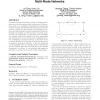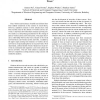132 search results - page 10 / 27 » Microscopic evolution of social networks |
COMAD
2009
13 years 8 months ago
2009
Positional analysis is considered an important tool in the analysis of social networks. It involves partitioning of the set of actors into subsets such that actors in a subset are...
KDD
2008
ACM
14 years 8 months ago
2008
ACM
A multi-mode network typically consists of multiple heterogeneous social actors among which various types of interactions could occur. Identifying communities in a multi-mode netw...
AINA
2007
IEEE
14 years 2 months ago
2007
IEEE
The evolution and existence of stable trust relations have been studied extensively in the context of social theory. However, reputation systems or trust schemes have only been re...
CIG
2005
IEEE
14 years 1 months ago
2005
IEEE
— We study by computer simulation a population of individuals playing the prisoner’s dilemma game. Each player has an invariable strategy (cooperate or defect) but the network ...
ASUNAM
2011
IEEE
12 years 7 months ago
2011
IEEE
—In this paper, we study the problem of evolutionary clustering of multi-typed objects in a heterogeneous bibliographic network. The traditional methods of homogeneous clustering...



